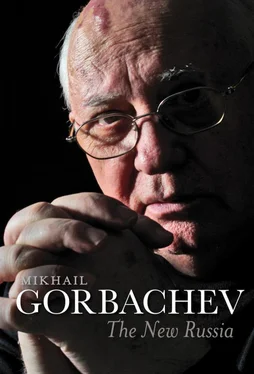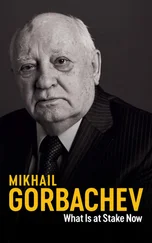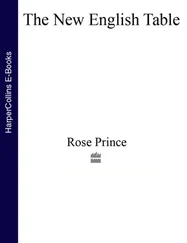On the eve of the referendum of 25 April 1993, I commented that, as formulated, it would not lead to a fundamental resolution of the crisis in the institutions of government or the country generally.
The referendum result was formally a victory for the president’s team. A majority voted ‘yes’ to the question of whether they had confidence in the president, and slightly more than half to the question of whether they approved of the government’s socio-economic policy. Taking account of the low turnout, this amounted to just over one-third of the electorate. As for the question of calling early elections, 49.5 per cent voted in favour of a new presidential election, and 67.2 per cent in favour of a new parliamentary election.
How should we interpret the result? In my opinion, the referendum result clearly reflected reluctance amongst a majority of people to return to the pre-Perestroika administrative-command past, which, presidential propaganda claimed, was the risk if supporters of the Congress won. ‘The referendum results’, I said, ‘do not allow us to recognize either side as the conclusive victor. Russian citizens are against confrontation: they want stability. They favour continuing the reforms, but with substantial modifications, primarily relief for those whom the reforms have put in special difficulties.’
What next? I had no doubt that a new constitution was needed, ‘but it would be unforgivable if it were the opportunistic fruit of the present political conflict. What matters most is that, after a draft has been agreed, the constitution should be adopted in an atmosphere of consent, within the framework of the constitutional process.’ The constitution should be adopted by a newly elected Supreme Soviet. Any coercion in adopting it would represent disrespect for the opinion of Russia’s citizens. ‘At all events,’ I stated at the end of May, ‘everything must be done in a lawful, legal manner. Only that can guarantee stable functioning of the Russian system of governance and safeguard the normal operation of Russian civil society, which is being born with so much travail.’
The Constitutional Convention established to put forward a draft new constitution was unable to do so. There was no substantive discussion at it, and in June I expressed my view that it had become a complete waste of time. I told reporters it was just ‘games that are not going to produce anything of value. We need politics, not political games.’
Summer 1993 was very busy for me, with several trips abroad, including to the Netherlands and Switzerland, where I worked on setting up the Green Cross International environmental organization. There was other charitable work too. On 7 June, Raisa and I were present at the opening of Russia’s largest and best-equipped department for bone marrow transplants at the National Children’s Hospital, with which she was constantly involved.
In 1990, Raisa became the patron of an international association, Haematologists of the World for Children, created specifically to provide modern treatment for the severest blood diseases in children. In March 1991, she donated a cheque for $100,000 to the Institute of Paediatric Haematology, which enabled doctors and nurses to be trained to use the latest medical technology and for them to work as interns at the most advanced haematology centres of the USA and Germany.
After December 1991, finance for building a specialized department for bone marrow transplant at the Institute of Paediatric Haematology was cut off. Resumption and completion of the building project was made possible when we succeeded in raising $1,000,000 for this specific purpose. Half was donated at my request by Fred Matser, a Dutch businessman and founder or co-founder of many charitable trusts, and the remainder was made up of fees I received for lectures during a trip to the United States in 1992. A further $1,000,000, needed to complete construction of the unit, was found after I made a number of appeals to the Russian government. Other foreign friends gave humanitarian and charitable aid to Russian organizations through the Gorbachev Foundation. On 24 August we delivered medical equipment to hospitals in the Stavropol region, purchased on the initiative of Maria Wilmes and a group of sponsors in Germany.
At that time I also finished work on Years of Difficult Decisions . [3] M. S. Gorbachev, Gody trudnykh reshenii. Izbrannoe. 1985–1992 , M.: Al’fa-Print, 1993.
The book contained my talks and speeches, transcripts of interviews and negotiations in the period from 1985 to 1992. Much of the material was being published for the first time (in particular, the minutes of sharp exchanges in the Politburo on 24–25 March 1988 in connection with the publication of an article by Nina Andreyeva in the newspaper Sovetskaya Rossiya ).
We delivered the manuscript of my book almost simultaneously to Russian and French publishers, but the Russian publisher was prevented from bringing it out. It was made very clear that if he did, both the publisher and printer could expect a raid by the authorities. The set type of the book was broken up. It was secretly set again from scratch by a printer in Ryazan, but the upshot was that the book appeared in France before it appeared in Russia.
Fateful Decisions, Fateful Days
Meanwhile, the government crisis caused by the irreconcilable stand-off between the president and Supreme Soviet continued and threatened serious trouble. The underlying cause was, of course, the deteriorating situation in the country. At the Foundation we analysed it and our conclusions were dismaying:
Among the bulk of the population, oppositional moods and mistrust of central government, both the president and the Supreme Soviet, are increasing but a majority, for a variety of reasons, are apprehensive of new, drastic changes. The relative equilibrium of power between the executive and legislative branches in the Centre is highly unstable (‘no parliament could work together with the current president in a stable manner’).
The ruling elites out in the regions are increasingly recruiting management specialists from among former Party staffers and trying to insure against further possible interference from the Centre. If elections were to be held in the autumn or winter the results would be totally unpredictable.
I, however, remained convinced that only new elections offered any hope of ending the protracted deadlock. In an interview for Rossiyskaya Gazeta on 19 August 1993, I said: ‘If today’s politicians have the good of Russia at heart, they simply must hold elections this autumn. Russia is drifting rudderless.’ The way out of the crisis lay in renewing the federal government. It was essential to bring the country back from its present chaos, and ‘only new people will be capable of doing that. In addition, they will be credited a modest, but nevertheless valuable, degree of trust.’
Yeltsin had a different plan, and apparently by the end of the summer had firmly made up his mind to resolve the crisis by getting rid of parliament. The president devoted the whole of September to preparing to remove it by force. Accompanied by the ministers of defence and of the interior, he personally checked the preparedness of elite divisions deployed near Moscow and army units to obey his orders. He started appearing on television wearing military camouflage and a maroon beret, and holding a combat rifle.
On 21 September 1993, the president of Russia signed Decree No. 1400 annulling the powers of the Congress of People’s Deputies and of the Supreme Soviet. The president ‘recommended’ to the Constitutional Court that it should suspend its sittings until the election of a new legislative body, the Federal Assembly, scheduled for 12 December. This fatal decision initiated a chain of events that largely determined the departures from a democratic path of development that we have witnessed over the following years and up to the present day.
Читать дальше












